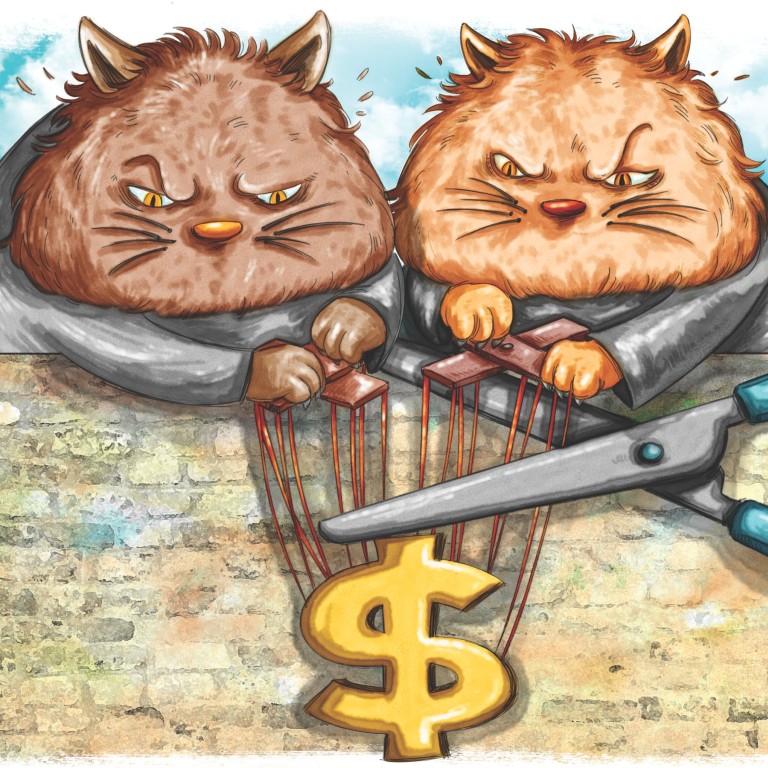
New Competition Ordinance seeks to impose a level playing field for smaller Hong Kong firms
New Competition Ordinance seeks to impose a level playing field for smaller firms as they compete with the fat cats in the business world
Since Coils Lam Wai-chun opened his first 759 Store five years ago, he has offered below-market prices, a strategy which makes him the bane of rival supermarkets, convenience stores and snack shops.
Lam, chairman of Hong Kong-listed CEC International Holdings and owner of the 270-strong snack chain, said he set prices at a level that would yield him profit of 37 per cent - although they are normally 10 per cent to 20 per cent lower than those of its bigger rivals.
Suppliers have since cut him off and wholesalers pester him to lift his prices to match his rivals, forcing him to source snacks, groceries and drinks directly from overseas merchandisers.
"I have been regarded as a troublemaker in the industry, but I am not," Lam told the . "It is not a sin or a crime to offer cheaper prices."
A newcomer like Lam to a market typically dominated by incumbents faces invisible barriers - pressure from bigger players to squeeze him out.
However, tactics like businesses undercutting rivals by setting excessively low prices, price fixing and bid rigging are considered anti-competitive practices from today when the Competition Ordinance comes into effect.
The new law not only places businesses and employees under closer scrutiny, but also aligns the city with international practice.
Hong Kong, a world city and top destination for initial public offerings, for a long time lagged behind more than 100 jurisdictions in introducing a legal regime for competition. Places like Singapore, Malaysia, Thailand, Britain, the United States and the European Union have competition rules in place.
Though it is not a criminal offence, sanctions for breaches include fines of up to 10 per cent of Hong Kong turnover for up to three years for any infringement. Directors can also be disqualified for up to five years.
Competition Commission chairwoman Anna Wu Hung-yuk said the law applied to all businesses - big and small.
"It is a protection for consumers and business itself," she said.
The watchdog had so far recorded about 400 cases, complaints or inquiries about price fixing, cartels and bid rigging, she said.
On top of its agenda for research are the building maintenance, fuel supply and supermarket sectors, she added.
The commission, with about 50 staff, will set up teams to carry out research before any probes are launched.
"We get support from the Independent Commission Against Corruption, which provides training programmes for our staff," Wu said. "Corruption and a lack of competition tend to come together."
In the 759 Store case, Lam said his early suppliers were reluctant to work with the chain.
He pointed to one case in which the marked price for distilled water was set at HK$2 per bottle at its store in Wong Tai Sin because any higher price did not sell well. But soon after he offered the price, a distributor rang him to tell him to raise the price to HK$3, a price similar to that of nearby convenience stores, or else supplies would be cut off.
"I dashed out of my Kwun Tong headquarters to the store in Wong Tai Sin and reset the price at HK$2.80 to put out the fire," he said.
Many suppliers stopped selling him soya milk, herbal drinks, soft drinks, distilled water, potato chips, chocolates and other snacks, which forced him to source products directly from wholesalers in South Korea, Japan, Taiwan and Europe, Most of these products are not yet on sale in Hong Kong supermarkets or convenience stores.
"I more than welcome the competition law," Lam said.
In response to questions about the implementation of the Competition Ordinance, Li Ka-shing's retail flagship, AS Watson, which runs about 280 supermarkets including ParknShop and Taste and about 220 Watson's pharmacies, said the city's retail market was "very competitive and diverse".
The group's spokesperson said it would abide by the new law.
Rival Dairy Farm International, which runs Wellcome supermarkets and 7-Eleven convenience stores, said it was well-prepared for the new law and was committed to compliance.
To avoid infringement, many companies and trade entities have issued internal guidelines.
The Hong Kong General Chamber of Commerce, the city's largest trade body, advised companies to refrain from exchanging commercially sensitive information such as price, cost, discounts or rebates, profit margins, pricing strategies and current or future price trends.
When sharing trade information, they can only mention historical data or information that is already in the public domain.
Fiona Loughrey, partner of law firm Simmons and Simmons, said employees should also observe the law.
For instance, when human resources executives of two rivals get together to discuss bonuses, pay rises or collusive tactics to block out rivals, they are in breach of the law.
"The key is when two independent undertakings from company A and company B agree to do or not to do something together," Loughrey said.
Hong Kong Small and Medium Enterprises Association permanent honorary chairman, Danny Lau Tat-pong said smaller firms risked "stepping on a landmine" if they shared commercial data at seminars or social gatherings.
"A key reason smaller firms join a trade body is to obtain commercial information, but the law means we must watch out what we say," he said. "I fear the law will snare smaller fry instead of big tigers."
Former legislator Ronny Tong Ka-wah noted that the law protected smaller firms, saying the rule governing such crimes as price fixing, bid rigging and output limitation were not applicable to companies with a combined turnover below HK$200 million in the preceding financial year.

